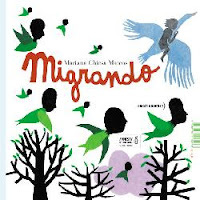Migrando, by Mariana Chiesa Mateos, Orecchio Acerbo Publishing House, March 2010.
a picture book where daily news wear evocative and touching images, where all of us could easily find a small fragment of our family's history crumpled by time. A beautiful book, a fair book, made only with illustrations, that goes directly to the heart of emigration issues without offering any resolution, without giving any judgement, where the author identifies with those who were, and still are, migrating.
I had already told you about this book in another post, while I was at the Bologna Book Fair, as it is such an incredible book though, I preferred to postpone a thorough presentation and spare it for a less chaotic moment.
I thought at length about the cut I wanted to give this article, I leafed through the book many times. As I usually do I put it aside for a while, to allow all the feelings and sensations I had felt to leave sediment, waiting for the right moment to write about it. And the right moment came this evening, while I was on my balcony. Are you wondering why I'm telling you about this insignificant detail? Because just while I was on the balcony, I suddenly remembered a peculiar episode: some time ago I was at the local kids bookshop, I was checking on some books when I noticed a dad entering the place with his two years old daughter, up to this moment nothing strange had happened, then, suddenly, at the sight of a wonderful object placed at the right height, the baby suddenly stops, fatally attracted she pulls her father by the trousers and cries: "Daddy, look, a pap of the world!".
Now, once the smile that always surfaces my face every time I recall this episode fades away, right there, on my balcony while holding a besom, I suddenly felt struck by the perfect résumé of this sentence, hiding so many, unconscious, meanings. Which is, in the end, one of every living creature's first instincts? Probably nourishment. And here it is, as simple as truth: through the plain, pragmatic needs of such a small kid, the world becomes a "pap of the world".
Absence of food, of well being if we extend the notion to a wider significance, is one of the reasons that lay behind many different actions, amid which emigration. This explains that look full of hope and expectations that yesterday, exactly like today, leads so many people to abandon their countries to reach those lands where they hope to find a better life.

It's never easy to leave your own country, even if it can be necessary, and that look with its sad smile seems to be telling us that the past is always relevant, that the needs we had in the past are the same we have nowadays, that, in the end, men never change.
Far from me the wish to make such a phenomenon, as complex as emigration, ordinary by bringing it back to the mere necessity of food: dealing properly such a topic would require much more time and space and, quite frankly, expertise I do not possess. Though, I am convinced that trying to understand the reasons that bring other people to our countries is the first, shy, step towards a real and aware integration. I also believe that this book could be the perfect tool to let our children better understand what happens around them.
As I was saying before, this is a wordless picture book, what I didn't tell you is that Mariana Chiesa Mateos started this project about two years ago, when she showed her future publishers a film she had shoot a few months before. The idea of the book we now see came from that very same short-film.
As many other wordless picture books, thanks to a skilful use of movie editing technique, Migrando as well follows the use of images in sequence. In small clips, Mariana Chiesa Mateos gets to illustrate with cleverness and sensibility, the story of a girl leaving with her parents for a trip: we don't know where she is directed, nor when she will come back, maybe she is leaving for a simple holyday, what we know is that she feels sad, that she would like to fly back on the wings of a swan

to find again someone she has left, maybe a grandmother, to hear her tell again of those times when, because of the war, men had abandoned their own country of origin to go elsewhere and try to make a new start. And so we can see the battle and soldiers dying, while frightened birds fly away from shots, and then we can see the big ships arriving and leaving, charged with their human load, only to put them down on the other side of the ocean. We can observe them, those emigrants full of hopes and just a few things, ready to look into the future, to build a house, a new life, all together.
We can see their intense eyes, the neckerchiefs over their hair, the babies covered in blankets like precious chrysalises. We can see them walking, full of faith, towards their future and we hope with them.
Then, in a sort of fusion, the first part of the book ends to leave space to present times: we rotate the book to meet the girl again, she is now a young woman, she is hugging her beloved and ready to leave. Once again we don't know where she is going, nor for how long, we only know she is sad because she is leaving behind those she loves. We know that she is going quite far away, as we see her climb onto an airplane. In that indefinite dimension that is space observed through a porthole, where everything is together incredibly small and incredibly big, the girl travels all alone, lost in her thoughts. But the world, down there, offers a new sight to observe: the ships are back again, no, it's not ships, it's boats, small, black boats, crowded with people;
at a short distance some light-hearted and unaware tourists are sunbathing on the beach. Someone finally sees the boats and comes to the help of those who are jumping into the sea. But this time it's the police that welcomes the shipwrecked once they step on the sand, a mother covers her son's eyes so he doesn't see the scene, others remain impassively on their sunbeds. The new emigrates will be held in a refugee camp fenced round with barbed wire, places they would like to escape to follow their dream of freedom. We don't know what their destiny will be, after all this is a piece of history that develops under our eyes, day after day.
If it's true that we are a population of emigrants, it's as well true that in the last fifty years we barricaded behind our little personal richness. Renouncing to well-being is difficult, though, if only we could stop a moment to think, we would know that we have no guarantee on what the future has in store for us; if only we could understand that maybe, one day, we could be emigrants again, then we should ask ourselves: how would we like to be received?
Copyright © text and images by Orecchio Acerbo 2010. Images have been reproduced with the permission of the Publisher.



